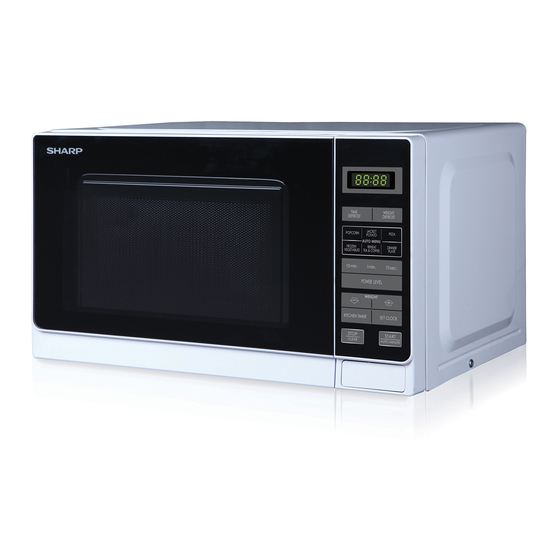Sharp Carousel R-220K Panduan Pengoperasian - Halaman 9
Jelajahi secara online atau unduh pdf Panduan Pengoperasian untuk Oven Microwave Sharp Carousel R-220K. Sharp Carousel R-220K 24 halaman. Sharp microwave oven operation manual model r-209k | r-220k | r-230k
Juga untuk Sharp Carousel R-220K: Panduan Pengoperasian (3 halaman), Panduan Pengoperasian (24 halaman), Panduan Pengoperasian (24 halaman)

I N F O R M A T I O N Y O U N E E D T O K N O W
ABOUT MICROWAVE COOKING
• Arrange food carefully. Place thickest areas to-
wards outside of dish.
• Watch cooking time. Cook for the shortest amount
of time indicated and add more as needed. Food
severely overcooked can smoke or ignite.
• Cover foods while cooking. Check recipe or cook-
book for suggestions: paper towels, wax paper,
microwave plastic wrap or a lid. Covers prevent
spattering and help foods to cook evenly.
• Shield with small flat pieces of aluminum foil any
thin areas of meat or poultry to prevent overcook-
ing before dense, thick areas are cooked thor-
oughly.
• Stir foods from outside to center of dish once or
twice during cooking, if possible.
• Turn foods over once during microwaving to
speed cooking of such foods as chicken and ham-
burgers. Large items like roasts must be turned
over at least once.
ABOUT SAFETY
• Check foods to see that they are cooked to the
United States Department of Agriculture's recom-
mended temperatures.
T E M P
160°F
... for fresh pork, ground meat, bone-
(71°C)
less white poultry, fish, seafood,
egg dishes and frozen prepared
food.
165°F
... for leftover, ready-to-reheat refrig-
(74°C)
erated, and deli and carry-out
"fresh" food.
170°F
... white meat of poultry.
(77°C)
180°F
... dark meat of poultry.
(82°C)
To test for doneness, insert a meat thermometer
in a thick or dense area away from fat or bone.
NEVER leave the thermometer in the food during
cooking, unless it is approved for microwave oven
use.
F O O D
• Rearrange foods such as meatballs halfway
through cooking both from top to bottom and from
the center of the dish to the outside.
• Add standing time. Remove food from oven and
stir, if possible. Cover for standing time which al-
lows the food to finish cooking without overcook-
ing.
• Check for doneness. Look for signs indicating that
cooking temperatures have been reached.
Doneness signs include:
- Food steams throughout, not just at edge.
- Center bottom of dish is very hot to the
touch.
- Poultry thigh joints move easily.
- Meat and poultry show no pinkness.
- Fish is opaque and flakes easily with a fork.
• ALWAYS use potholders to prevent burns when
handling utensils that are in contact with hot food.
Enough heat from the food can transfer through
utensils to cause skin burns.
• Avoid steam burns by directing steam away from
the face and hands. Slowly lift the farthest edge
of a dish's covering and carefully open popcorn
and oven cooking bags away from the face.
• Stay near the oven while it's in use and check
cooking progress frequently so that there is no
chance of overcooking food.
• NEVER use the cavity for storing cookbooks or
other items.
• Select, store and handle food carefully to pre-
serve its high quality and minimize the spread of
foodborne bacteria.
• Keep waveguide cover clean. Food residue can
cause arcing and/or fires.
• Use care when removing items from the oven so
that the utensil, your clothes or accessories do
not touch the safety door latches.
7
